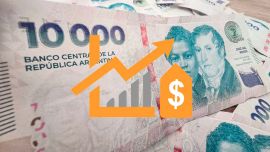The nationwide lockdown that President Alberto Fernández decreed on Thursday, March 19, to stop the spread of the novel coronavirus in Argentina will be extended until at least Sunday, April 12, sources inside Casa Rosada confirmed this week.
Multiple outlets, including Perfil, Infobae and La Nación, all reported on Thursday that the decision had been taken by the president to extend the mandatory quarantine, which is currently set to expire on March 31.
At print time, the Health Ministry said there were 101 new Covid-19 cases registered yesterday, with 690 cases nationwide since the beginning of the pandemic.
Five new deaths were confirmed yesterday, including two men aged 81 and 73, and a 72-year-old women all with previous health conditions. The remaining were a 59-year-old male with a history of recent travel to Italy and 70-year-old man that had recently visited the United States.
Both cases remained under examination for possible related ailments. Argentina’s mortality rate is currently 2.1 percent, with 17 confirmed deaths for Covid-19, 12 of which were tied to related conditions, the most common of which were diabetes and obesity.
One of the deaths in the capital related to the passing of an 82-year-old woman at the Cervantes old people’s home in Floresta.
When the elderly woman showed symptoms of Covid-19 last Tuesday, she was rushed to the Hospital Italiano where she died on Thursday. Following confirmation of coronavirus yesterday, her 32 fellow residents and the home’s five employees were immediately evacuated from the Cervantes home by 15 ambulances.
DECISION
According to reports in local outlets, the decision to extend the quarantine has been taken already by President Fernández.
Infobae said the Frente de Todos leader has read “more than a dozen scientific essays and journalistic articles” about the crisis, as well as speaking to a host of government officials and international figures, including Italian Prime Minister Giuseppe Conte and Spanish leader Pedro Sánchez.
Fernández has himself hinted at the possibility – which sources say the government already considers inevitable – of extending the quarantine.
Speaking on Thursday in an interview with TV Pública, the president hinted that a decision had been made, saying it was important to “first of all … preserve people’s health.” He added that he had “to be careful” and said a potential decision to reopen schools was not “urgent.”
On Wednesday, he told Telefe’s Cortá por Lozano show that, if necessary, “quarantine will be extended.”
However, reports also suggested the “preventative and obligatory” period of social isolation could last until May, if the number of confirmed Covid-19 cases soars and the infection curve refuse to flatten.
Restrictions on movement could also be eased in some provinces that have not presented confirmed cases, or in regions that have managed to control the outbreak, government sources told Perfil.
Earlier this week, government officials confirmed that the first cases of “community circulation” had been registered – that is, people who have tested positive for Covid-19 and cannot trace direct contact with someone previously infected who has travelled outside the country.
RESTRICTIONS
The Health Ministry, led by Dr Ginés González García, estimates that cases will peak in Argentina between late April and early May, partly due to the virus’ incubation period of between two and 14 days, and partly due to delays in carrying out studies. This means that the confirmed cases will increase during the first stage of quarantine, which will serve as a “trial period” to evaluate how the measure is functioning.
The government has yet to conclude exactly how the restrictions on movement and economic measures will affect the recession, though their impact will be substantial, given the almost total stop of activity.
Speaking earlier this week, the Peronist leader said his government would seek to help those affected, but warned he would prioritise the nation’s health over its economy.
“Economic conflicts are being generated, but when you govern you have to face dilemmas and the option was to take care of the economy or life – I chose to take care of the life and health of the Argentine people,” he declared.
– TIMES


























Comments